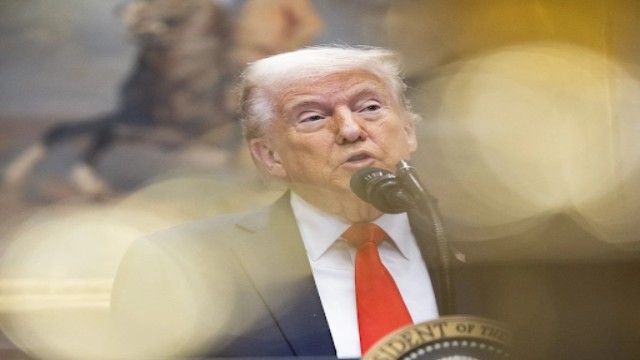
U.S. President Donald Trump speaks in the White House’s Roosevelt Room in Washington, DC, on March 3, 2025. (Getty Images)
U.S. President Donald Trump sounded hopeful about the relationship between his country and Canada after a phone call with Prime Minister Mark Carney. However, the looming threat of new American tariffs next week remains.
Speaking from the Oval Office, Trump described his conversation with Carney as “very good” and said he believes things will go “very well” between the two nations. He added that while Canada might be on better terms with the U.S., other countries may not be so lucky.
On April 2, Trump plans to introduce new tariffs, including a 25% tax on foreign-made cars and parts. This is significant for Canada, as auto exports are the country’s second-largest export to the U.S., after oil and gas. These tariffs would be in addition to the 25% steel and aluminum levies the U.S. imposed earlier this month.
Trump has also suggested that other Canadian exports, such as pharmaceuticals, semiconductor chips, and softwood lumber, could be affected by the new tariffs.
After the call, Carney said Trump didn’t promise any exemptions for Canada but called the discussion “constructive.” He noted that Trump respected Canada’s sovereignty, both in private and public statements. Carney stressed that the U.S. tariffs have permanently changed the Canada-U.S. relationship, calling for a renegotiation of their partnership.
Carney announced that his government is prepared to introduce billions of dollars in counter-tariffs if the U.S. follows through with the border levies. He also revealed plans for a $5 billion “trade diversification corridor fund” to improve Canada’s transportation infrastructure, including ports, railways, and airports. This move aims to reduce Canada’s dependence on U.S. trade.
Despite Trump’s positive comments, he confirmed that he would impose more tariffs if Canada retaliated. U.S. Vice President JD Vance echoed Trump’s tough stance. Speaking from Greenland, Vance warned that Canada cannot win a trade war against the U.S., claiming that Canada benefits from “unfair rules.”
Trade expert Mark Warner cautioned that Trump’s friendly tone might not signal a shift in policy. He suggested that Trump might simply prefer dealing with Carney, a former Goldman Sachs executive, over Conservative Leader Pierre Poilievre.
Warner advised Canadian businesses to prepare for the worst by making their operations “Trump-proof” and less reliant on U.S. markets.
After the call, Trump posted on social media, praising Carney and predicting his victory in the upcoming federal election. Trump wrote that he looks forward to meeting Carney right after the election to strengthen political and business ties between the two nations.
Trump also made a point to use Carney’s official title—prime minister—instead of the mocking nickname “governor” he had used for former Prime Minister Justin Trudeau.
While Trump expressed optimism about Canada, Carney warned that Canada must rethink its trade strategy and reduce its dependence on the U.S. He stressed that building new trade relationships quickly is essential, even though it will be a long and difficult process.















